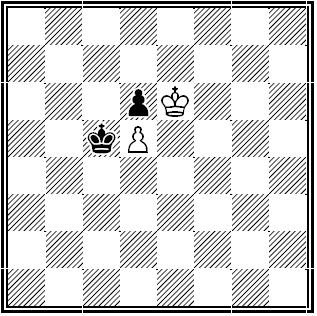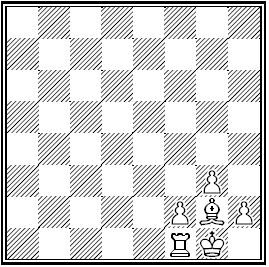Goofy Chess Terms
A nice feature of my web log is I can see what terms or words people used on google to reach my site. Surprisingly, the following four words were often the most frequent. I feel guilty because I only used the words in passing and never really thought that somebody on the internet would be looking for an actual definition of the words. Since I am all about pleasing my readers (even those who accidentally find my blog via googling), this posting is for you.
 “Zugzwang” – While sometimes spelled “Zugswang,” the version with the two Z’s tends to be the preferred one. Technically, it means a “situation in a chess game in which a player is forced to make an undesirable or disadvantageous move.” Literally, it is a situation where a chess player would ultimately like to “pass on his/her turn” (i.e., let his/her opponent move twice). Of course, forfeiting one’s turn is not possible. Thus, in certain situations a chess player will be forced to move a piece to his or her detriment. The word is generally associated with king pawn endgames or other situations where there is a minimal amount of material on the board. As the universe of possible moves shrinks and grows smaller (i.e., as pieces are eliminated), the chances for Zugswang increase. In rare situations, there will be “double zugzwang.” This occurs when on a static board the player who moves first loses. (As example, see left).
“Zugzwang” – While sometimes spelled “Zugswang,” the version with the two Z’s tends to be the preferred one. Technically, it means a “situation in a chess game in which a player is forced to make an undesirable or disadvantageous move.” Literally, it is a situation where a chess player would ultimately like to “pass on his/her turn” (i.e., let his/her opponent move twice). Of course, forfeiting one’s turn is not possible. Thus, in certain situations a chess player will be forced to move a piece to his or her detriment. The word is generally associated with king pawn endgames or other situations where there is a minimal amount of material on the board. As the universe of possible moves shrinks and grows smaller (i.e., as pieces are eliminated), the chances for Zugswang increase. In rare situations, there will be “double zugzwang.” This occurs when on a static board the player who moves first loses. (As example, see left). “Fianchetto” – The hardest part about this word is pronouncing it: “"fee-an-ket-toe" (I always want to say “fee-an-chet-o”, but the “ch” here is a hard “c” sound (like “Christmas” or “character”) not the typical “ch” sound found in “chair.” The concept itself, however, is simple. It is basically the position you see to the left -- a protuding pawn (here at g3), a bishop right beneath it (here g2) and finally a castled king (Technically, the castling part is not required, but it is very common). It is, of course, possible to have a similiar position on the queenside. As a general rule (one that has so many exceptions it is dubious whether it can even be called a rule), fiahchettoed bishops are more valuable then the other bishop or knights. In other words, it should not be traded unless very good reason to do so. This conclusion is based on the weakened pawn structure of the king after the key is played. The fianchettoed bishop acts well in overcoming this formation’s weaknesses. If it is removed though, the pawn structure is considered pretty weak.
“Fianchetto” – The hardest part about this word is pronouncing it: “"fee-an-ket-toe" (I always want to say “fee-an-chet-o”, but the “ch” here is a hard “c” sound (like “Christmas” or “character”) not the typical “ch” sound found in “chair.” The concept itself, however, is simple. It is basically the position you see to the left -- a protuding pawn (here at g3), a bishop right beneath it (here g2) and finally a castled king (Technically, the castling part is not required, but it is very common). It is, of course, possible to have a similiar position on the queenside. As a general rule (one that has so many exceptions it is dubious whether it can even be called a rule), fiahchettoed bishops are more valuable then the other bishop or knights. In other words, it should not be traded unless very good reason to do so. This conclusion is based on the weakened pawn structure of the king after the key is played. The fianchettoed bishop acts well in overcoming this formation’s weaknesses. If it is removed though, the pawn structure is considered pretty weak.“Patzer” – Either an unskilled chess player or one demonstrating very poor sportsmanship/etiquette . . . or both! A patzer is usually associated with cheap gimmicks (i.e., trap openings (the "Patzer Opening" [1.e4 e5. 2. Qh5] being the most obvious!), anal retentiveness regarding rules (i.e., trying to have his lost game annulled because his opponent used the wrong hand to play the clock), and providing unsolicited advice (often still during the match!). It is an ugly word, associated with ugly people in chess. As with any negative term, some people will latch onto it affectionately, but as with most terms with negative connotations the general rule is that you can always refer to yourself (or possibly your friends) as a patzer, but never complete strangers.
“Sandbagger” – A term used to define a chess player who has purposely (either through downright lying or game fixing) underinflated his or her chess abilities (usually his or her chess ratings). Since chess tournaments are organized by rankings, there are large incentives for players to try to play at lower levels. For those new to the game, this seems odd: usually you want to lie about how good you are, not how bad you are! Chess is strange due to the tournament structure. For example, one tournament might include rounds where players are ranked under 2100, under 1900, under 1500, and under 1200. A person ranked 1905 would be very unlikely to win the under 2100 tournament because he or she would be facing people with higher scores (all the way up to 2099!). However, simple lying or one or two purposely lost games can put that same chess player easily in the under 1900 range. This would be good for the chessplayer because for the under 1900 group, he would be a strong favorite for winning. “Sandbagging” is a sad result of people’s priorities. Especially when cash or prizes are given to tournament winners, players would much rather win a low ranking tournament round (ex. Under 1500) than have a better-than-average performance in a higher ranking round (ex. under 2100). Of course, the reality is the overwhelming majority of players in the under 2100 tournament round who didn’t win are “better” than the hypothetical under 1500 sandbagging champion. But at the end of the day, the sandbagger gets a trophy and his name printed up some where. That is all that is important to them. Because it skews and distorts the chess rating system, sandbagging is severely looked down upon. It tends, however, to be difficult to catch. The most common method of sandbagging, purposely losing games, can be hard to identify since people legitimately have cold snaps, losing streaks, and make huge blunders. People legitimately lose games all the time that they “should” have won. Thus, finding someone who loses games on purpose is difficult.


5 Comments:
... and because it's so difficult is why the USCF has a ratings floor. (to prevent repeated abuse)
About the word Zugzwang: Since it's a german word the correct spelling is as shown here with 2 Z's. Directly translated it means "forced move".
Your first position actually has a technical term for it BTW-
"trebuchet".
technically fianchetto does not only refer to a bishop placed controlling a one of the longest diagonals and the diagram you posted the pawn structure and the bishop placement is no neccessary.
fianchetto just means having control of the long diagonals.
not how bad you are! Chess is strange due to the tournament structure. For example, one tournament might include rounds where players are ranked under 2100, under 1900, under 1500, and under 1200. A person ranked 1905 would be very unlikely to win Aion kinah the under 2100 tournament because he or she would be facing people with higher scores (all the way up to 2099!). However, simple lying or one or two purposely lost games can put that same chess player easily in the under 1900 range.
Post a Comment
<< BACK TO THE REST OF THE SITE!